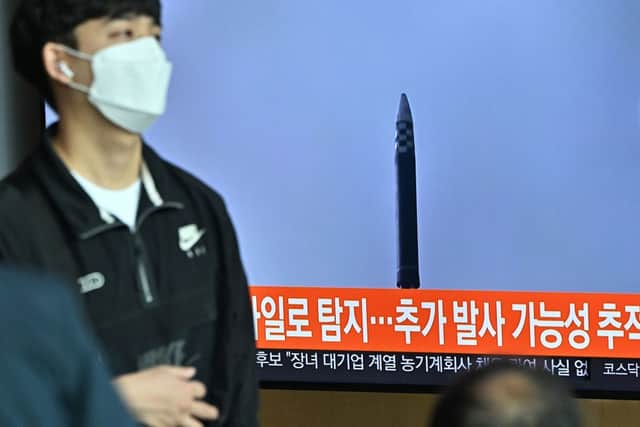North Korea: how will Covid cases affect population and missile tests - what Kim Jong Un’s lockdown looks like
and live on Freeview channel 276
Six people have died and 350,000 have been treated for a fever that has spread “explosively” across North Korea one day after the country acknowledged its first Covid-19 outbreak.
While the rest of the world struggled with Covid-19, North Korea claimed to not have been affected by the pandemic.
Advertisement
Hide AdAdvertisement
Hide AdMany believe the secretive state’s claims of zero coronavirus cases to be false of course, but now the reclusive country has finally admitted the virus has breached its borders.
The official Korean Central News Agency (KCNA) said tests on samples gathered on Sunday (8 May) from an unidentified number of people with fevers in Pyongyang confirmed they were infected with the Omicron variant.
Leader Kim Jong Un has even imposed a strict nationwide lockdown to contain the pandemic’s first confirmed Covid-19 breakout.
So why the change in tact from stubborn denial of the inevitable, to an admission of North Korea’s own fallibility?
Here is everything you need to know.
What does coronavirus mean for North Korea?
Advertisement
Hide AdAdvertisement
Hide AdFor more than two years, North Korea has maintained the widely questioned claim of having kept the virus from entering its borders, despite it having spread to practically every country on the planet.
Though claims of zero Covid cases have been contested, it is thought any outbreaks that may have occurred could genuinely have been relatively minor, thanks to stringent viral controls introduced almost immediately as the pandemic began.
North Korea described the drastic measures taken to halt the coronavirus’ spread in early 2020 as a matter of “national existence”, effectively shutting off cross-border movement and trade - it is even believed to have ordered troops to shoot trespassers on sight.
Experts now believe the North’s rare admission of an outbreak is a call for outside assistance, and though the size of the spread is not known, even a relatively small outbreak could have serious consequences.
Advertisement
Hide AdAdvertisement
Hide Ad“There has been the biggest emergency incident in the country, with a hole in our emergency quarantine front, that has been kept safely over the past two years and three months since February 2020,” the official KCNA news agency said.


The country’s health-care system was already lacklustre, and the North’s draconian border closures further damaged an economy already reeling from decades of mismanagement and US-led sanctions over its nuclear and missile programmes.
Its population of 26 million people also remain largely unvaccinated, after repeated government refusals to accept vaccines from the UN-backed Covax distribution programme.
Leif-Eric Easley, a professor of international studies at Seoul’s Ewha Womans University, told the PA News agency that Pyongyang’s admission of Omicron cases “must mean the public health situation is serious.”
What does North Korea’s lockdown look like?
Advertisement
Hide AdAdvertisement
Hide AdAccording to KCNA, Kim Jong Un has called for a complete lockdown of North Korea’s cities and counties, and said workplaces should be isolated by units to prevent the virus from spreading.
He has urged officials to stabilise transmissions and eliminate the infection’s source as quickly as possible, while minimising public inconvenience caused by restrictions.
Despite the decision to elevate antivirus steps, Kim has ordered officials to push ahead with scheduled construction, agricultural development and other state projects while bolstering the country’s defence postures to avoid any security vacuum.
How will it affect the North’s nuclear ambitions?
North Korea has in recent weeks made itself known on the world stage once again with persistent ballistic missile tests, which it says prove its nuclear programme is progressing.
Advertisement
Hide AdAdvertisement
Hide AdBut some experts have noted that the virus’ presence might jeopardise the leadership’s plans for further missile or nuclear tests.
But this does not seem to be the case, and South Korea has already said North Korea fired three short-range ballistic missiles toward the sea only hours after it confirmed its first case of the coronavirus.
The three missiles were reportedly launched on Thursday (11 May) afternoon from North Korea’s capital region, and flew toward the country’s eastern coast.
The tests could serve as a reminder of North Korea’s commitment to move forward with its efforts to enhance its arsenal despite the outbreak, in order to rally support behind Kim Jong Un and maintain pressure on its adversaries.
Advertisement
Hide AdAdvertisement
Hide AdPyongyang’s cases admission could have a surprising morale-boosting effect among the country’s population, while also opening up the possibility of aid.
“This does not mean North Korea is suddenly going to be open to humanitarian assistance and take a more conciliatory line toward Washington and Seoul,” said Easley.
“But the Kim regime’s domestic audience may be less interested in nuclear or missile tests when the urgent threat involves coronavirus rather than a foreign military.”
Comment Guidelines
National World encourages reader discussion on our stories. User feedback, insights and back-and-forth exchanges add a rich layer of context to reporting. Please review our Community Guidelines before commenting.
